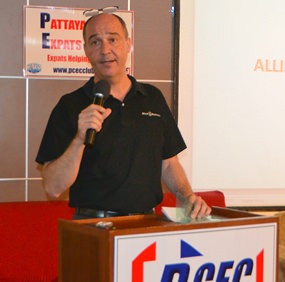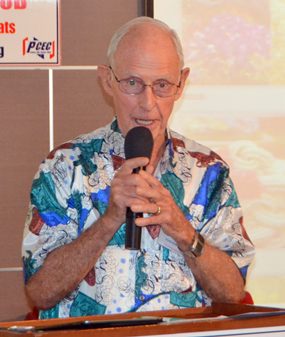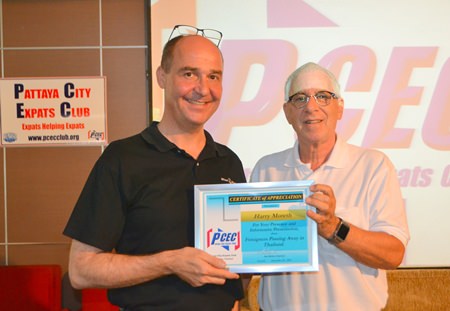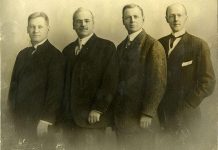What happens if you die in Thailand? This question was answered at the Pattaya City Expats Club’s September 7 meeting by Harald (Harry) Moreth, Manager of International Operations at John Allison Monkhouse International Funeral Directors, whose mortuary is in Bangkok.
Harry has been an Expat most of his life. He was brought up abroad, is well versed in Expat life and speaks several languages fluently. He served in the German Foreign Service for 23 years as a consular officer specialising in crisis management in places like Jordan, Pakistan and Iraq. He was the consular officer in charge of death cases at the German Embassy in Bangkok for five years from 2008 to 2013.
 Harry Moreth explains what happens if you die in Thailand and the options available for the handling of your remains, including repatriation to your home country.
Harry Moreth explains what happens if you die in Thailand and the options available for the handling of your remains, including repatriation to your home country.
The main location for Allison Monkhouse Funeral Directors is in Melbourne, Australia. It is a family owned business originally started in the early 19th century in England moving to Melbourne in the 1860s. From their Bangkok offices, they specialize in the repatriation of deceased foreign nationals to their home countries as well as local funerals, cremations and repatriation of ashes. Harry said they work with most international insurance companies and, locally, with the consular services of most embassies in Bangkok and the region.
Harry said that when he was a consular officer, one of the problems he encountered frequently was people passing away and leaving behind friends or family that did not know what to do with respect to the disposition of the body and matters related to the estate. He recommended that you write out what you want done if you pass away here and leave it with someone or better yet, prepare a will with this information to ensure your wishes are carried out.
What happens when a foreigner passes away in Thailand? Harry said that unless the person dies in a hospital, the first thing that occurs is that the police get involved. They take note of the facts, secure the person’s belongings, and prepare a police report. (The identification of the body is done by a policeman together with a medical person.) Harry said that in his experience, the police have always been very helpful in these cases. Second, a death report is issued. This is done by the hospital where the person died or if the body was taken there. Otherwise, the death report is issued by a mortuary or forensic centre. Third, a death certificate is issued by the local amphur (District Office) based on the report.
Further, unless the cause of death is very clear – such as a motorcycle accident – any foreigner who dies in Thailand will have an autopsy performed at the request of the police. People can choose to have their bodies cremated. The urn can be handled in different ways. It can be interned in a wall, which is what many Thais do. It can be taken out to sea and the ashes scattered. It can be sent to family or friends in the person’s home country (but it must be sent via a funeral home in that country). Or it can be handed over to someone locally here in Thailand. If a person chooses to have his body shipped back to his home country, by law the body must be embalmed. The body is shipped in a coffin. It is also possible to arrange burial in a cemetery here in Thailand.
 Club member Richard Smith describes the upcoming excursions he is organizing. This month, the trip will be a visit Bangkok’s biggest flower market followed by a dinner cruise on the Chao Phraya River. Also, because of popularity, he is in process of organizing another shopping trip to Bangkok to the Ikea store and the Mega Mall.
Club member Richard Smith describes the upcoming excursions he is organizing. This month, the trip will be a visit Bangkok’s biggest flower market followed by a dinner cruise on the Chao Phraya River. Also, because of popularity, he is in process of organizing another shopping trip to Bangkok to the Ikea store and the Mega Mall.
Harry recalled one case where the person did not leave a will; as a result, there was a two-and-a-half year legal battle over the estate. Harry added that in order to register a will and have an executor appointed, one must go to a provincial court. The executor will then get the court’s authority to dispose of the person’s assets in accord with their will.
He mentioned that their funeral home in Thailand is the only one with a fully equipped mortuary, including cool storage facility, and the only one in Thailand who perform embalming by international standards. Harry introduced Jason Scovell, who is the Mortuary Manager for the Australian location and is currently in Bangkok providing training to the Bangkok staff. They also offer pre-paid and pre-arranged funerals. Funeral arrangements start around 40,000 baht; prepaid plans include obtaining the death certificates, making arrangements with the Wat (if cremation done here in Thailand) or funeral directors in the home country if repatriation of body or ashes is desired.
Harry was asked what happens when one’s religion forbids a full embalming. He replied that a minimum embalming is possible, but that in such cases, the repatriation of the body must be done quickly. Their website URL is www.funeralrepatriation .com/funeral for Bangkok and http://www.monkhouse .com.au/ for Australia.
After Harry concluded his presentation, Master of Ceremonies Richard Silverberg brought everyone up to date on upcoming events and called on Roy Albiston to conduct the always informative Open Forum where questions are asked and answered about Expat living in Thailand, especially Pattaya.
For more information on the PCEC’s many activities, visit their website at www.pcecclub.org.
 PCEC Master of Ceremonies Richard Silverberg presents Harry with a Certificate of Appreciation for his informative presentation to the Club.
PCEC Master of Ceremonies Richard Silverberg presents Harry with a Certificate of Appreciation for his informative presentation to the Club.




